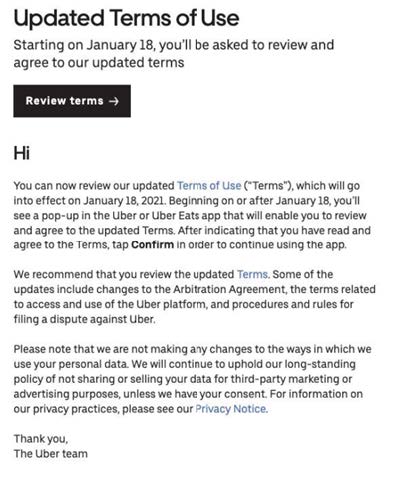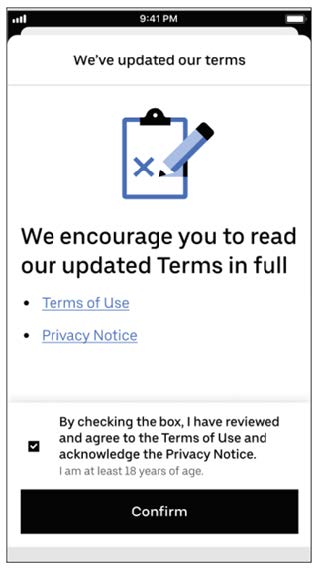Wu v. Uber Tech., Inc.: New York State's Highest Court Issues a Veritable Instruction Manual for Drafting Enforceable Clickwrap Agreements to Arbitrate
Read part one, "A Bronx Tale: A New York State Trial Judge Calls Out New York State's Long-Standing Heightened Standard of Proving the Making of an Agreement to Arbitrate," about the trial court's decision in Wu v. Uber Tech., Inc.
Just before the 2024 holiday season, in Wu v. Uber Tech., Inc.,[i] New York State's Court of Appeals, the state's highest court, issued a veritable instruction manual for those involved in the online provision of consumer services or the sale of goods on how to correctly set up clickwrap contracts to require customers to arbitrate disputes.
Additionally, while Wu involved a customer's personal injury claim against Uber, the high court's holding should allow those involved in the online sale of consumer goods or the provision of consumer services to use a clickwrap contracting process to limit their financial exposure to often astronomically costly class action lawsuits and their more recent variant, mass arbitrations, by carefully drafted arbitral provisions.
In Wu, the Court of Appeals upheld the clickwrap contracting process in which Uber's customers must consent to its "Terms of Use" in order to use the Uber app. The court held that the clickwrap contracting process resulted in an agreement to arbitrate between Uber and its customers. In doing so, the high court "appl[ied] centuries-old principles of contract law to [Uber's] web-based 'terms of use' update containing an arbitration agreement[.]."
Additionally, the court also held that "[u]nder well-established law, a person who accepts a written contract without first undertaking [a] review [of the terms] generally bears the risk that the agreement may contain provisions they do not like or expect," in plaintiff Wu's case, an agreement to arbitrate her personal injury claim.
A Visual Roadmap
The reason Wu can be likened to an instruction manual is that the court used graphics and easy-to-understand explanations. One graphic was this image of Uber's January 2021 email that was "circulated … 'on a mass basis' to millions of the company's U.S. users," including plaintiff Wu, "informing them that, in the upcoming days, they would be prompted to agree to updated terms of use in order to continue using the ride-sharing service." Here is the image from the decision itself:

Another image was of the screen that, after her receipt of Uber's mass email, plaintiff Wu saw when she logged onto the Uber app on her smartphone. The screen presented her with an in-app blocking pop-up screen with a headline that stated: "'We've updated our terms.'" Here is the image from the decision:

The Court of Appeals noted that the screen was "uncluttered" and that it "encouraged plaintiff to review the new terms of use and included a hyperlink to those terms indicated by underlined and blue text." The court also observed that "at the bottom of the screen was a checkbox and, to its immediate right, bolded text stating: 'By checking the box, I have reviewed and agreed to the Terms of Use and acknowledge the Privacy Notice.'" The court explained that "[i]mmediately beneath this was a large black button labeled 'Confirm'" and "that plaintiff checked the box and clicked the 'Confirm' button."
Uber's new terms, accessible via hyperlink on the screen, stated up-front:" '[B]y accessing or using [Uber's] Services, you confirm your agreement to be bound by these Terms. If you do not agree to these Terms, you may not access or use the Services.'" The Court of Appeals also drew attention to "the fifth paragraph of the terms sets forth the following warning in bolded, all-capitalized text":
"'IMPORTANT: PLEASE BE ADVISED THAT THIS AGREEMENT CONTAINS PROVISIONS THAT GOVERN HOW CLAIMS BETWEEN YOU AND UBER CAN BE BROUGHT, INCLUDING THE ARBITRATION AGREEMENT (SEE SECTION 2 BELOW). PLEASE REVIEW THE ARBITRATION AGREEMENT BELOW CAREFULLY, AS IT REQUIRES YOU TO RESOLVE ALL DISPUTES WITH UBER ON AN INDIVIDUAL BASIS AND, WITH LIMITED EXCEPTIONS, THROUGH FINAL AND BINDING ARBITRATION (AS DESCRIBED IN SECTION 2 BELOW). BY ENTERING INTO THIS AGREEMENT, YOU EXPRESSLY ACKNOWLEDGE THAT YOU HAVE READ AND UNDERSTAND ALL OF THE TERMS OF THIS AGREEMENT AND HAVE TAKEN TIME TO CONSIDER THE CONSEQUENCES OF THIS IMPORTANT DECISION.'"
The principles of contract law that the U.S. Court of Appeals applied to the foregoing were straightforward. "An offeree is placed on inquiry notice of contractual terms when those terms are clearly and conspicuously presented to the offeree as a contract and made available for review," the Court observed. Thus, the Court held, "there is no requirement that a party have correctly understood—or even reviewed—the terms presented by the offeror for their manifestation of acceptance to be effective."
Groundbreaking Significance
From start to finish, Wu was a groundbreaking case. The Court of Appeals noted that the parties had agreed on appeal that the Federal Arbitration Act (the "FAA") governed. However, in the trial court, the Supreme Court of New York State, Bronx County,[i] an issue was raised as to whether the FAA or New York State's arbitration law applied to the issue of the making of the agreement to arbitrate between Wu and Uber.[ii]
As mentioned earlier. Hinshaw wrote an analysis of this case in January 2023[iii] about how, with true Bronx scrap and gutsiness, Justice Veronica G. Hummel held that the decision of the U.S. Court of Appeals for the Second Circuit in Progressive Casualty Ins. Co. v. C.A. Reaseguradora Nacional de Venezuela[iv] required her not to apply New York State's stringent requirement that proof of plaintiff Wu's agreement to arbitrate" 'must be clear, explicit and unequivocal … and must not depend upon implication or subtlety[.]'"
Justice Hummel held that, under Progressive Casualty, New York State's preponderance of the evidence standard for proving the making of agreements generally applies to proving the making of an agreement to arbitrate applied.
Class Action Waivers
The U.S. Court of Appeals did not address the issue of class action waivers because plaintiff Wu sued for physical injuries she sustained while being a passenger in an Uber vehicle. Nonetheless, the high court's decision merits a discussion here of its implications for avoiding consumer class action lawsuits and limiting the impact of mass arbitrations.
The key to avoiding class action lawsuits is now well-known: within the arbitral provisions of the consumer contract, whether in paper form or online, include an enforceable class action waiver.
The validity of class action waivers was upheld nationally in 2011 in the groundbreaking decision of the U.S. Supreme Court in ATT Mobility, Inc. v. Concepcion. Since then, class action waivers have become almost ubiquitous in consumer contracts.
However, over the years, a number of class action waivers have not held up under judicial scrutiny. In accordance with the instruction manual provided by the U.S. Court of Appeals in Wu concerning how to make an enforceable agreement to arbitrate, a class action waiver in the arbitral provisions of a contract for the sale of consumer goods or the provision of consumer services should be easy to understand, straightforward, and well thought-out. Of course, this is but one reason that businesses seeking to require arbitration of consumer disputes should not rely upon off-the-rack arbitral provisions, a point which this author has spoken about many times.
Mass Arbitrations
Given the success of class action waivers in the years since Concepcion, plaintiff class action lawyers have resorted in recent years to filing what are called mass arbitrations to circumvent class action waivers.
Mass arbitrations are the filing, typically by one law firm or several law firms acting in concert, of many, sometimes thousands, of individual demands to arbitrate the same dispute against the same business or businesses.
Mass arbitration "may create administrative burden and onerous fees, as well as delay and potential unfairness to all Parties," [v] which, of course, is why the shake-down artists purporting to be advocates for consumers have resorted to them in the face of class action waivers after Concepcion. As such, mass arbitrations are simply par for the course in this area of practice.
Fortunately, earlier last year, two major arbitral institutions, the American Arbitration Association ("AAA") and the Judicial Arbitration and Mediation Services, commonly known as JAMS, rolled out new rules in order to address the abuse of mass arbitration. They differ in a number of important ways, including the following:
- The AAA Mass Arbitration Supplementary Rules ("AAA MA")[vi] define "Mass Arbitrations" as "twenty-five or more similar Demands for Arbitration … filed against or on behalf of the same party or related parties, …where the representation of the parties is consistent or coordinated across the cases."
- By contrast, under the JAMS Mass Arbitration Procedures and Guidelines ("JAMS MA"), "a Mass Arbitration is defined as 75 or more similar Demands for Arbitration, or such other amount as is specified in the Parties' agreement(s), filed against the same Party or related Parties by individual Claimants represented by either the same law firm or law firms acting in coordination."
- The AAA MA provides that "[t]he AAA may apply these Supplementary Rules to any group of cases defined as a Mass Arbitration[.]"
- JAMS, however, requires that "the Parties have agreed to the application of these Mass Arbitration Procedures and Guidelines in a pre-or post-dispute written agreement."
Key Takeaways for Businesses
A complete comparison and contrast of the AAA MA and the JAMS MA is not the intention of this particular update. For now, the point is that businesses opting for arbitration as the means of dispute resolution with their customers should no longer rely on off-the-rack arbitral provisions.
Instead, a business involved in the sale of consumer goods or the provision of consumer service should seriously consider the contract's agreement to arbitrate early on, including an analysis of which rules, if any, are better suited to that business's particular needs.
Ideally, this review would be performed in consultation with outside counsel who is well-versed in the laws and ways of arbitration. Given the lingering hostility of some judges to class action waivers despite clear decisions by the U.S. Supreme Court in the 13 years since Concepcion, businesses rely on off-the-rack arbitral provisions at their peril.
[i]Wu v. Uber Tech., Inc., 2024 N.Y. LEXIS 1896, 2024 NY Slip Op 05869 (N.Y. Nov. 25, 2024).
[i]By way of an oddity of history, the many Supreme Courts in New York State are actually trial courts established in each county of New York State.
[ii]Wu v. Uber Tech., Inc., et al., 78 Misc. 3d 551 (N.Y. Super. Bronx County 2022), aff'd, 219 A.D.3d 1208 (N.Y. App. Div. 2023), aff'd, 2024 N.Y. LEXIS 1896, 2024 NY Slip Op 05869.
[iii]A Bronx Tale: A New York State Trial Judge Calls Out New York State's Long-Standing Heightened Standard of Proving the Making of an Agreement to Arbitrate (Hinshaw Legal Updates, Jan. 9, 2023) .https://www.hinshawlaw.com/newsroom-updates-ny-state-trial-judge-calls-out-heightened-standard-of-proving-making-of-argument-to-arbitrate.html.
[iv]Progressive Casualty Ins. Co. v. C.A. Reaseguradora Nacional de Venezuela, 991 F.2d 42 (2d Cir. 1993).
[v]www.jamsadr.com/mass-arbitration-procedures.
[vi]Chrome extension://efaidnbmnnnibpcajpcglclefindmkaj/https://www.adr.org/sites/default/files/Mass-Arbitration-Supplementary-Rules.pdf
